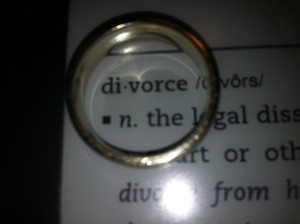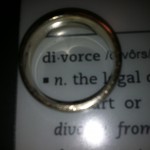 When is divorce permissible?
When is divorce permissible?
This question is asked over and over. People want an itemized list of the precise situations in which divorce is permissible, accompanied by specific scriptural references to back it up.
Most pastors are more than happy to provide such a list.
The tradition in which I was raised said divorce is permissible only for adultery or abandonment. Then they would hasten to add that divorce is never required, only permitted…implying divorce is never the best course of action…just an option for those of lesser faith.
Some were quick to add, “Divorce really shouldn’t even be in a Christian’s vocabulary”…as though they hadn’t just made use of the word divorce themselves in forming the sentence prohibiting its use…and as though divorce were such an awful thing we’re better off pretending it doesn’t even exist.
If pressed, they would emphatically state that divorce is always sin…though sometimes permissible. Which doesn’t make a lot of sense. Why would sin ever be permissible? And if it is permissible, how could it be sin?
They had a ready list of scripture references to back up their position…Matthew 19 for adultery…1 Corinthians 7 for abandonment. They called these the exception clauses…because divorce is prohibited except for these exceptions in which it is permissible…though not required.
Notice the use of legal language, here. Make no mistake. This is a legal discussion.
The topic of biblical divorce is almost always discussed in theological circles as a point of legality. What does The Law say about divorce? Except they don’t use the words legal or law, because the New Testament scripture is quite clear in telling us that those who are in Christ are not under the law.
So, we have this legal debate amongst theologians making use of legal terms to argue their points…in which all participants are making their arguments based on the assumption that The Bible (i.e. The Law) generally prohibits divorce, but then provides these exception clauses for which divorce is permissible in some circumstances.
And it is these exception clauses that everyone is debating. It is the exception clauses that parishioners ask questions about.
When is divorce permissible?
Does physical violence count as abandonment? Does emotional abuse count as abandonment? Does emotional withdrawal count as abandonment? Does being too lazy to work to provide for your family count as abandonment?
And we have a wide array of legal points being continually debated…with most parties very emphatically stating their position in very confident tones…as though only an idiot or a reprobate could possibly fail to agree with their position.
Sadly, many are also more than willing to sacrifice an abused woman’s health, safety, and well-being to protect the position they’ve staked in this legal debate…despite acknowledging that as a Christian she is not even under The Law.
And this legal debate has literally been going on for thousands of years.
Some Pharisees came to Jesus, testing Him and asking, “Is it lawful for a man to divorce his wife for any reason at all?” (Matthew 19:3)
Theologians (also known as lawyers…because in a theocratic society they are the same thing) were having this same debate over 2000 years ago, when Jesus walked this earth.
When is divorce permissible?
If the answer is as clear as these legalistic theologians would have us believe, why has it been a point of debate for thousands of years?
I’ll tell you why. It is because scripture is not at all clear in answering this question. In fact, the biblical authors seem to almost go out of their way to be intentionally vague on this topic…persistently refusing to answer this question.
In Deuteronomy 24:1-4, the Mosaic Law very clearly makes provision for divorce. It requires that if a husband sends his wife away, he must also give her a certificate of divorce, so that both parties are free to remarry, with no obligation to the marriage vows. Furthermore, if the woman marries another husband and he also divorces her, then the first husband is forbidden from remarrying her.
Most theologians today agree that in this Deuteronomy passage God was protecting women from a form of legalized prostitution that was common at that time. For enough money, a man would verbally divorce his wife (put her away without providing a certificate of divorce) and allow another man to have sexual intercourse with her. Then the second man would divorce her, and the original husband would reclaim his rights as her husband.
So, in order to protect women from this immoral practice, the Mosaic Law required a certificate of divorce be issued, and forbade a former husband from remarrying a wife who had married another man.
The Mosaic Law is virtually silent on the topic of when divorce is, or is not, permissible. It simply says, “When a man takes a wife and marries her, and it happens that she finds no favor in his eyes because he has found some indecency in her…” The Mosaic Law made no attempt to define what all circumstances might be considered “some indecency.” Although it clearly made provision for just divorce, The Law never defined under what circumstances divorce was permissible.
This was, in fact, the point of the legal debate the Pharisees brought to Jesus in Matthew 19. They were in agreement that The Law required a certificate of divorce to be issued, as Jesus noted in Matthew 5:31. However, they had an ongoing legal debate as to what was permitted under “some indecency.”
At that time, some were exploiting the lack of legal definition of permissibility to say a man could divorce his wife for any reason whatsoever…including because he found another woman more desirable…or because another man found his wife desirable. So, they were right back to the wife-swapping tricks of their ancestors, except with slightly more protection for the abused wife in the form of a divorce certificate.
One publicized example of the day was King Herod’s marriage to the wife of his brother. John the Baptist incurred the wrath of both Herod and Herodias by calling them out on their adultery. As a result, John was imprisoned and beheaded. The Pharisees were probably hoping for a similar demise for Jesus when they asked him this question.
Jesus did not hold back in denouncing this immoral wife-swapping practice of divorcing for the explicit purpose of marrying someone else. Jesus called it adultery. However, Jesus clearly upheld provision for divorce as being necessary, yet fell short of giving a detailed list under what circumstances divorce is permissible. Here’s what he said:
Because of your hardness of heart Moses permitted you to divorce your wives; but from the beginning it has not been this way. And I say to you, whoever divorces his wife, except for immorality, and marries another woman commits adultery. (Matthew 19:8-9)
If Jesus wanted us to have a well-defined legal list of conditions under which divorce is permissible, this was a perfect chance to provide that. Yet He did not. Jesus said Moses made provision for divorce because of hardened hearts…one spouse’s heart becoming hardened against the other. He went on to say divorcing for the purpose of wife-swapping is adultery. Yet, he included the phrase “except for immorality.”
And theologians today debate the phrase “except for immorality” in exactly the same manner the lawyers of Jesus day debated the phrase “some indecency.” In both cases, they are attempting to draw specifics that simply are not there. Both phrases are intentionally vague…intentionally open-ended.
Why? Why did Jesus and Moses both refuse to explicitly answer the question, When is divorce permissible?
I would submit the question is never answered because it is not a valid question.
The question presumes divorce is forbidden except for specific clearly legally defined circumstances. The question presumes divorce permissibility is first and foremost a legal issue. The question presumes it is the right of a judge, or pastor, or fellow Christian to judge for someone else whether or not they should divorce…as though anyone else besides God could possibly know and judge the deeply personal issues that can arise within the intimate bounds of marriage.
I would submit that scripture is silent on this topic specifically because each individual Christian must search out for themselves the guidance of The Holy Spirit in determining the best course of action in their specific marriage.
If that makes you uncomfortable, maybe you should spend some time prayerfully contemplating why you are uncomfortable with Christians relying on the guidance of The Holy Spirit for major life decisions…and why you feel the need for legalistic rules by which to admonish others.
Jesus was, apparently, quite comfortable with that.

 One July morning in 1994, I found myself sitting in my pastor’s living room. He had graciously responded to my desperate phone call with an invitation to come over and talk. My wife had left me, and I had no idea what to do. All I wanted was God’s best for our family of four young children.
One July morning in 1994, I found myself sitting in my pastor’s living room. He had graciously responded to my desperate phone call with an invitation to come over and talk. My wife had left me, and I had no idea what to do. All I wanted was God’s best for our family of four young children.